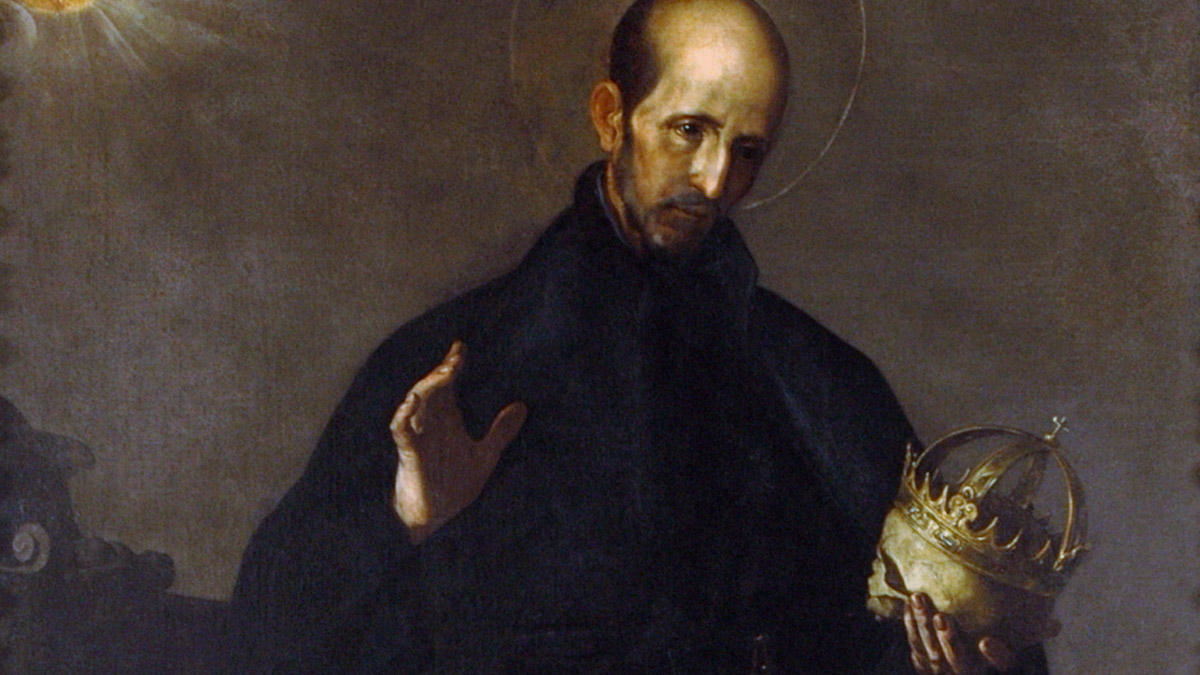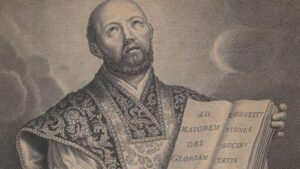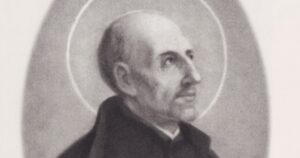
St. Francis Borgia was a royal-born husband and father, Jesuit priest, and superior-general. Francis was born in eastern Spain in 1510. He was born into the Spanish branch of the Borgia family, his father being the 3rd Duke of Gandia and his mother being the granddaughter of King Ferdinand V of Aragon. Francis’s paternal great-grandfather was Pope Alexander VI. Francis was educated by his uncle, the Archbishop of Saragossa, Spain. Francis expressed a wish to become a monk, but his family sent him in 1528 to serve at the Court of the King of Spain Charles V, to whom he was related. He served with distinction, and was a valued advisor to the King.
MARRIAGE AND CHILDREN
In 1529, he married a Portuguese woman of noble birth, Eleanor de Castro. Together, they had eight children, the last born in 1539. Francis underwent a religious conversion or awakening in 1539, and that same year, he was appointed viceroy of Catalonia. He turned some of his attention toward composing and restoring liturgical music. He became acquainted with [Sts.] Peter Faber and Peter of Alcantara, both of whom played active roles in the Catholic Church’s reform in the wake of the rise of Protestantism. These men helped Francis to grow in virtue and commit to meaningful prayer. When his father died in 1543, he became the 4th Duke of Gandia. He withdrew from public life and went with his family to live in Gandia.
Eleanor died unexpectedly in 1546, leaving Francis with eight children.
DIFFICULT DECISION
His long-held dream of living as a religious rose to the surface, presenting him with having to make some very big changes. He decided to join the Society of Jesus, which had just formed about ten years previous. During the next several years, he made arrangements for the proper care of his younger children. He went to Rome, where he met with the Jesuits, and then returned to Spain. There, he relinquished his titles and vast holdings, bequeathing them to his oldest son, Charles. He was admitted to the Jesuits and was ordained a priest in late 1550. He helped to establish what was known as the Roman College, which later became the Gregorian University, and he also preached in Spain and Portugal, drawing large crowds. Despite his wishes to live a life of solitude, the Jesuits recognized his impressive talents as an administrator, and placed him where he was most needed. He discovered that Pope Julius III intended to appoint him a cardinal. Since the Jesuits had one of their core tenets that they would never hold high Church office, Francis met with [St.] Ignatius, the Jesuit’s founder, about the matter. They made a plan for Francis to secretly leave Rome and return to northern Spain, where he could live in solitude. With time, he recognized that his God-given talents needed to be used to build up the Church, and he accepted appointment as the Jesuit commissary for Spain in 1554. There, he oversaw the establishment of a Jesuit novitiate and twelve colleges. In 1556, he was appointed to supervise the order’s missions to the far east and the West Indies.
AN UNEXPECTED APPOINTMENT BEARS FRUIT

In 1565, [St.] Ignatius’s successor died and Francis was elected as the superior-general of the Society of Jesus. The growth that he oversaw during his tenure in this role was truly extraordinary. He played an instrumental role in countering the rise of Protestantism with reforms to correct abuses, errors, and ignorance. He established discipline in Jesuit formation and wrote guidebooks, fine-tuning the rules. He established the Jesuits in Poland and strengthened them in France and Germany. He expanded the foreign missions, including into Mexico and Florida. In 1571, he was sent by Pope [St.] Pius V on a tour of Spain, during the clashes with the Turks which culminated in the Battle at Lepanto later that year. In Spain and Portugal, Francis again attracted large crowds to hear him preach, but he grew ill and weak during this trip. He died after returning to Rome, September 30, 1572 at age sixty-one.

St. Francis Borgia’s success as an administrator was so impressive, he is often called the second founder of the Jesuit order. He gave the order vitality at a time when the Church in Europe was greatly distressed and the faithful were suffering. Kings and Popes respected his wise counsel. To the missionaries in the far east and in the Americas he wrote numerous personal letters of fatherly guidance. Despite his many talents, he preferred to live a simple life and never lost his desire for prayerful solitude. As a member of the often-notorious Borgia family, he could have led a life of comfort and privilege, but chose to give it all up in order to dedicate himself tirelessly to spreading the Kingdom of Jesus Christ. He was beatified in 1624 and canonized in 1670, and he is the patron of Portugal and of Gandia. His feast day is celebrated on October 10, especially by the Jesuits.
